八年级英语下Unit10 It's a nice day isn't it?复习课
《It’s a nice day, isn’t it?》教学教案材料

《It’s a nice day, isn’t it?》教案新目标英语八年级下Unit 10It’s a nice day, isn’t it?教案设计阅读下面选自人教版《新目标英语》八年级下第十单元的教材内容,用英文完成一课时的教学设计,内容包括:教学目标、教学重点、教学难点、教学过程和板书设计五个方面。
【参考设计】Teaching Objectives:1. Students can master the following words, phrases and the sentence patterns.① Words: rain, umbrella, late, weather, concert, line②Phrases: small talk, move slowly, twice an hour, take the train③ Sentence patterns: —He’s really good, isn’t he?—He sure is!2. Students can know how to make a small talk and in what situationa small talk will happen.3. Students can improve their listening and speaking ability and train their skills of communication.4. Students will know which kind of small talk is appropriate and which is not.Teaching Key Points:(1) To understand what the small talk is.(2) To make a small talk using the tag questionsTeaching Difficult Point:To make a small talk using the tag questionsTeaching Procedures:Step 1 Warming up & Lead in(1) Brainstorming: The teacher uses some toys to describe a situation to the students:T: This is a rabbit and this is a dog. They don’t know each other before. They are strangers. Now they are waiting for a bus at the bus station. Do you think they will talk with each other?Ss: Yes.T: What do you think they will talk? How do they start the talking?S1: You look beautiful.S2: Why hasn’t the bus come yet?S3: Where do you go?……(2) The teacher explains to the students what the small talk is and asks students to try to go on a small talk.(Justification: It will arouse students’ interests to lead in the class using the teaching tools. In the meantime, it’s of great importance for them to understand the meaning of a small talk.)Step 2 Pre-listening(1) Group work:① Ask students in different groups to say what is happening in each picture and what people will talk in these pictures. Help students understand that the persons in the picture don’t know each other. They are strangers.②Presentation: Explain the differences in starting a small talkbetween Chinese and foreigners.Write the sentence pattern on the blackboard: —He’s really good, isn’t he?—He sure is!(2) Ask Ss to circle the situations where they would start a small talk and make a list of other places where they would talk to people they don’t know.(3) Discussion: Ask some students to write down their answers on the blackboard, and then have a discussion with Ss about the places where a small talk often takes place and where it rarely takes place.(Justification: To provide background knowledge to the students, including the culture, situation and the key points they are going to learn in the class.)Step 3 While-listening(1) Read the listening instruction to the class and explain to them what they are going to do.(2) Play the tape for the first time. Ss only listen.(3) Play it for the second time and ask Ss to number the pictures in the order.(4) Presentation: Check their answers and provide the tape script. Point out the tag questions and ask Ss to pay attention to them.(Justification: Students will learn some listening strategies while listening and they will understand the tag questions more deeply.) Step 4 Post- listeningPractice:(1) Reading Aloud: Ask students to read the three conversations after the tape. Pay attention to the pronunciation and intonation.(2) Role play: Ask students to practice the dialogues in pairs and then invite some of them to stand up to act out the dialogues.Production:(1) Look at the pictures and make other conversations using the expressions in the box in activity 1c. Teacher moves around to give some support if necessary.(2) Role play: Invite a few pairs to practice their conversations to the class. The teacher gives some suggestions and encouragement.(3) Encourage them to make a small talk according to picture b in activity 1a and share their answers.(Justification: Students can master the target language through practice and they can also practice their speaking.)Step 5 Summary and homeworkSummary:(1) To conclude the meaning of the small talk and the situation where the small talk often takes place.(2) To explain to the students it is a good way to make a small talk with tag questions and sum up the tag questions they’ve learned in the class.Homework:Write down the conversations in activity, and it’s better to recite them.(Justification: To consolidate what Ss’ve learned in the lesson.)。
英语人教版八年级下册Unit 10 It’s a nice day,
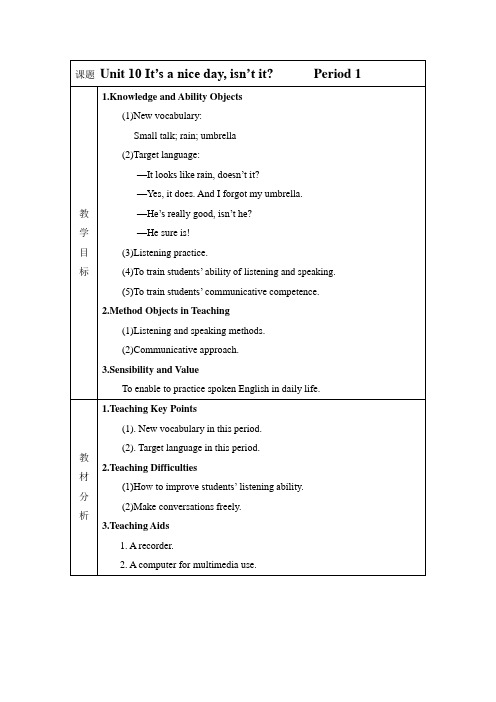
Girl1: Do you have his new CD?
Girl2: Yes, I do.
Conversation 2
Girl3: This line is moving slowly, isn’t it?
Step V1cPairwork
This activity provides guided oral practice using the target language.
Ask students to look at the pictures on the screen one by one. Get students to
Woman: Me, too.
Conversation 3
Boy: The train is late, isn’t it?
Man: No, today is Sunday. The trains only run twice an hour on weekdays.
Boy: Oh, I didn’t know that. I usually take the train on weekdays.
Woman: Yes, it is. We’ve been here for 20 minutes already.
Girl3: I hope the movie is good.
Woman: So do I. Do you think it’s going to rain?
Girl3: I hope not!
(2). Master the structures in Grammar Focus.
八年级英语下册_Unit_10_It’s_a_nice_day_isn’t_it单元训练_人教新目标版

八年级下册Unit 10 It’s a nice day ,isn’t it?1.重点词汇:rain , umbrella , alone , elevator , cross , cost , rockey ,along , traffic , least , small talk , opening question ,look through , come along , get along , thank-you note , at least.2.重点句型: ---It’s a nice day ,isn’t it? --- Yes , it is. I really love hot weather. ---You’ re Jenny’ s friend , aren’ t you? ---Yes , I am.基础卷(20分钟)1. 闲聊_____________ 6. opening question_____________2. 浏览杂志_____________ 7. thank-you note_____________3.与某人相处融洽_____________ 8. come along_____________4.在电梯里_____________ 9. by next Monday_____________5. 至少_____________ 10. wait in line_____________1.small talk 2.look through the magazine 3.get along (on) with sb. 4.in an elevator 5.at least 6.开场白,起始句 7.感谢信8.出现,陪伴,过来 9.在下周一以前 10 排队等候二、在Ⅱ栏中找出与Ⅰ栏相对应的句子( )1. Do you love country or jazz? A. I hope so.( )2. Do you think you can finish the work before Monday? B. No , I didn’ t. ( )3. Did you go to Today Beach yesterday? C. Neither.( )4. You didn’t go hiking , did you? D. Well, I really love violin music, and I can play the violin. ( )5. So , tell me something about yourself. E. Yes , I did. It’s beautiful. CAEBD 点拨:这—问句是选择疑问句,一般不用Yes/No来回答。
八年级英语Unit 10 It's a nice day,isn't it

Unit 10 It’s a nice day, isn’t it?
Pairwork.
Section A
3b Practice the conversation in activity 3a. Then write and practice another conversation with your partner. You can use situations like these:
Section A
a. I hope so. I want to go swimming. b. Yes. It rains every Saturday! c. At Franklin Lake. 富兰克林湖 d. Oh? Where do you swim? 在中午之前 e. Do you think it’ll stop by noon? f. It always rains on the weekend, doesn’t it? g. Do you ever go there?
It’s really cold today, isn’t it? The No. 15 bus stops here, doesn’t it?
Unit 10 It’s a nice day, isn’t it?
Go through
Section A
反意疑问句的表达
Grammar It’s really windy today, isn’t it? Focus You’re Ben’s sister, aren’t you?
Unit 10 It’s a nice day, isn’t it?
Listening
Section A
1b Listen and number the pictures above in the order you hear them.
新课标人教版八年级英语下册Unit 10 It’s a nice day, isn’t it--SE

Unit 10 It’s a nice day, isn’t it?Part 1: Teaching designSECTION BGoals● To put Tag questions intopractice● To read in EnglishProceduresWarming up by singing a:The Verb SongSara JordanStructures Tag questions Target language It’s a nice day isn’t it? Yes, it is. I really love hot weather.You’re Jenny’s friend, aren’t you? Yes, I am.Vocabulary Umbrella, bookstore, elevator, low, price, slowe along, get along, at least, be care forLearningstrategies Cooperating; Using what you knowChorus:Hey, hey! This is the verb song. Hey, hey! Let’s talk about verbs. We need them in our sentences.They’re very important words.There are action verbs, helping verbs, and linking verbs, too.All of these verbsare fun to use.An action verb is active.It’s a special word becauseit gives action to a sentence.It tells what the subject does!Walk, talk, run, dance,sit, smile, row.These are some action verbsthat we know.ChorusA helping verb helps an action verb make more sense.It’s a very useful wordto have in any sentence.Can, had, may, haveshall, will, mustThese are helping verbswhen they’re used with action verbs.ChorusA linking verb links the subjectto the predicate.It works with a pleting wordThey’re good partners, yo u can bet!Am, is, was, seemlook, feel, bee;These are linking verbswhen there are no action verbs.Chorus1a Looking and checkingHello, class! You are happy today. Aren’t you? Yes, it is a bright sunny day. So you are happy, and I am happy.Just now I had a small talk with you. We all like to have a small talk, don’t we? Ok, turn to page 79, will you? Check the questions you like when having a small talk with someone.Which on do you like better?For me, the first one about thrillers is great!1b Doing pairworkYou are going to make up a conversation using one of the questions from 1a, aren’t you? Then you will practice it with your partner, won’t you?Listen to the three conversations, won’t you? Where are the people in each conversation? Write the places in the chart on page 79.2b Listening matchingYou are going to listen again. And you will match each question with the correct answer on page 79.Ok, have you done it right? You will go on to read the tapescript for a betterand pay attention to the form of Tag Questions.2c Doing pairworkIn pairs you are going to role play one of the topics on page 79.3.Hi! My name’s Andy. I’m Karen’s brother.4.You love baseball games, don’t you?A: Hi! You’re new here, aren’t yo u?B: Yes, I am. What about you? Aren’t you new here, are you?A: No, I am not.B: You study here and live here, don’t you?A: Yes, I do. And I was born here, too. Where are you from? B: I am from Shanghai. Have you been there, haven’t you? A: Yes, I ha ve. It rains a lot there, doesn’t it?B: Yes, it rains a lot in summer. We take an umbrella to school.A: What about the traffic in Shanghai?B: It is better than it used to.A: Tell us something about the environment there, will you?B: It is getting bet ter and better. So is Taiyuan, isn’t it?A: Yes, it is. Taiyuan is getting cleaner and cleaner. I wish you a good stay in Taiyuan.B: Thank you very much.3aReading and matchingThere are three notes on page 80, aren’t there. You will go on to read them and match each of them with the correct situation.While you read—cut/ the sentences into thought groups, blacken the predicates, underline the useful expressions and darken the connectives.Answers: 3 →a thank-you note for a gift; 1 →a thank-you note for a party; 2 →a thank-you note for helpAfter you read—copy all the useful expressions into your Expression-Book.being the new kid, at school, have a wonderful time, on Saturday night, really friendly to me, really funny, feel like part of the group now, have a hard time, e along, reallygood at math, help me with math project, get along in a new place, the tickets for next week’s game, go with me, think of… , win the game3b Filling in blanksOn page 80, you will find an unpleted passage. Read it and plete it.Dear Sarah,Thank you for inviting me to your house on Friday. I really enjoy meeting your family.And baby sister is really loving. I had a wonderful time. I’m sorry I had to leaveearly, but I had a family dinner. My grandfather was having his 90th birthday party!Your sincerely,Maria3c Writing a thank-you noteBasic Structure Of a Thank-You Note1) Say thank you!2) Make it personal.3) Theme--worldly*4) Thoughts on gift or event.5) Say thank you again!6) Closing: I love you all etc...Dear Zhang Haifeng,Thank you very much for getting me the train ticket to Beijing yesterday. I really appreciate your help. I know it is very difficult to buy a train ticket to Beijingduring the Spring Festival season. Thank you once again. And if you have anythingI can do for you, just tell me about it.4 Doing pairworkOn page 80 at the bottom is a sample card. Read it, will you? And write your own card to be used for a small talk with your partner.Closing down by learning about English songsTo end this period, let’s do something interesting, will you? We shall go on to readsome names of English songs. See which songs you could sing.。
Unit 10 It's a nice day ,isn't it 教案 (人教版八年级下) (2)

八年级下Unit10 It’s a nice day ,isn’t it?Section A Period 1备课时间:第14周拟使用时间:第15周,星期一教师寄语:不经风雨怎能见彩虹?学习目标:1. 学习并掌握本课的单词及短语。
2. 掌握本课的重点句型:(1.)It’s a nice day ,isn’t it? Yes, it is (2.) What a nice day,isn’t it?(3.) It looks like rain,doesn’t?(4 ) The No.15 bus stops here ,doesn’t it? Yes, it does(5) I hope so / not. (6) So do I.3. 通过自主学习,合作学习等学习策略,训练学生的逻辑思维,快速反应能力和实践能力,学会反义疑问句在对话中的运用一、前置测评:听写本课的单词,并重点记忆不熟练的。
(8分钟)二、认定目标:师生共同认定。
(1分钟)三、自主探究:1. 看课本76页,快速完成1a。
2、听对话完成1b3、然后用所给的词组及1a的图画练习1c的对话,小组竞赛,评出优胜组。
4. 听录音,完成2a。
师生共同核对答案。
5、再听一遍录音,完成2b,个别小组展示答案,师生共同核对6. 同桌合作完成2c,小组展示对话情况题组训练:按要求写出下列单词1.sandy(名词)_____2.cross(介词)____3. low(反义词)______4. slow(同义词)______5. slow(反义词)______6.cost(过去式)_______7. review(同义短语)_______8.me(反身代词)______ 9.go(过去分词)______ 10.little(最高级)______归纳总结:师生共同总结反义疑问句的一般变化规则及答语四、达标测评:配套46页第二题1---5五、拓展提高:互动105三题作业布置; 作业一:互动104页第二题(必做题)作业二:互动104第一(B)题(选做题)教学反思:成功之处:不足之处:措施(原因):八年级下Unit10 It’s a nice day ,isn’t it?Section A Period 2备课时间:第14周拟使用时间:第15周,星期二教师寄语:It’s never too old to learn .( 活到老,学到老。
新目标英语八年级下册Unit 10 It’s a nice day, isn’t it

第 1 页 (共6 页) 第 2 页 (共6 页)学校 姓名 班级 考场 考号---------------------------------○密------------------ -------------------○封----------------------------- -- --○线----------------------------※※※※※※※※※※※※※※※答※※※※※※※※※※※※※※※※※※题※※※※※※※※※※※※※※※※线※※※※※※※※※※※※※新目标英语八年级下册Unit 10 It ’s a nice day, isn ’t it?讲解与练习讲解 一.短语1. small talk 闲聊2. look through 浏览,快速查看3. a thank-you note 一封感谢信4. be friendly to sb. 对某人友好 Mrs li is very friendly to every student.李老师对每个学生都十分友好。
5. feel like (doing) sth. 想要(做)……6. come along 到达,出现,跟着来,赶快7. have a hard/difficult time doing sth 做某事 很难 I have a hard time learning English.我学英语很吃力。
8. get along/ on 相处 9. at least 至少 二、 反意疑问句的概念及构成反意疑问句表示提问者有一定的主见,但没有把握,希望对方证实一下。
反意疑问句由两部分组成,前一部分是对事物的陈述,后一部分是简短的提问。
反意问句的结构可分为两种:A:十,一?,B:一,十?(注:“+”表示肯定,“一”表示否定)。
It is a fine day, isn’t it? It isn’t a fine day, is it? 三.反意疑问句的解答步骤1.判定(判断该用肯定还是否定);2.找动(找句子的助动词:按原形do ,单三does ,过去时态did 加);3.换代(将主语换为代词);4.完成(写上问号,注意语调)。
初二Unit 10 It’s a nice day, isn’t it
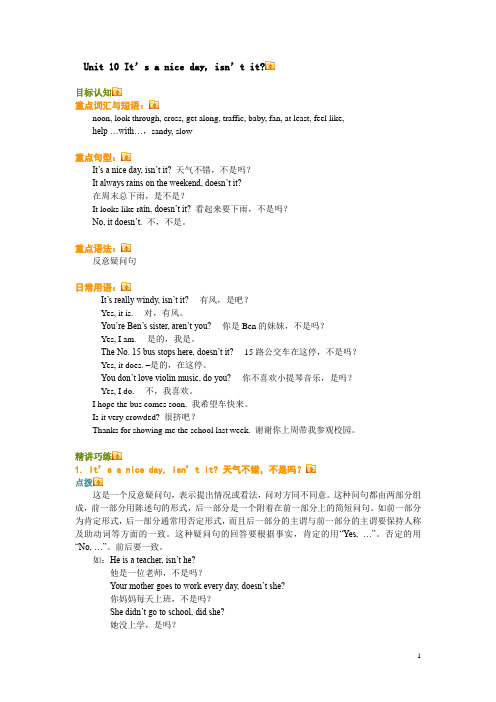
Unit 10 It’s a nice day, isn’t it?目标认知重点词汇与短语:noon, look through, cross, get along, traffic, baby, fan, at least, feel like,help …with…,sandy, slow重点句型:It’s a nice day, isn’t it? 天气不错,不是吗?It always rains on the weekend, doesn’t it?在周末总下雨,是不是?It looks like r ain, doesn’t it? 看起来要下雨,不是吗?No, it doesn’t. 不,不是。
重点语法:反意疑问句日常用语:---It’s really windy, isn’t it? ---有风,是吧?---Yes, it is. ---对,有风。
---You’re Ben’s sister, aren’t you? ---你是Ben的妹妹,不是吗?---Yes, I am. ---是的,我是。
---The No. 15 bus stops here, doesn’t it? ---15路公交车在这停,不是吗?---Yes, it does. –是的,在这停。
---You don’t love violin music, do you? ---你不喜欢小提琴音乐,是吗?---Yes, I do. ---不,我喜欢。
I hope the bus comes soon. 我希望车快来。
Is it very crowded? 很挤吧?Thanks for showing me the school last week. 谢谢你上周带我参观校园。
精讲巧练1. It’s a nice day, isn’t it? 天气不错,不是吗?点拨这是一个反意疑问句,表示提出情况或看法,问对方同不同意。
人教新目标八年级下Unit 10 It’s a nice day, isn’t it教案
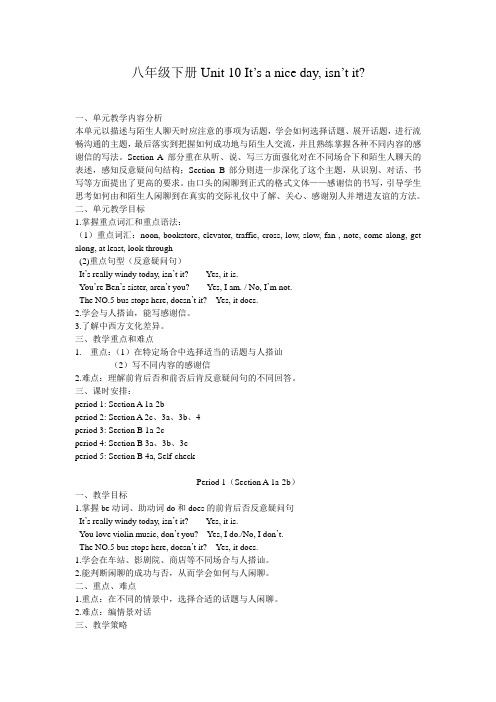
八年级下册Unit 10 It’s a nice day, isn’t it?一、单元教学内容分析本单元以描述与陌生人聊天时应注意的事项为话题,学会如何选择话题、展开话题,进行流畅沟通的主题,最后落实到把握如何成功地与陌生人交流,并且熟练掌握各种不同内容的感谢信的写法。
Section A 部分重在从听、说、写三方面强化对在不同场合下和陌生人聊天的表述,感知反意疑问句结构;Section B部分则进一步深化了这个主题,从识别、对话、书写等方面提出了更高的要求。
由口头的闲聊到正式的格式文体——感谢信的书写,引导学生思考如何由和陌生人闲聊到在真实的交际礼仪中了解、关心、感谢别人并增进友谊的方法。
二、单元教学目标1.掌握重点词汇和重点语法:(1)重点词汇:noon, bookstore, elevator, traffic, cross, low, slow, fan , note, come along, get along, at least, look through(2)重点句型(反意疑问句)It’s really windy today, isn’t it? Yes, it is.You’re Ben’s sister, aren’t you? Yes, I am. / No, I’m not.The NO.5 bus stops here, doesn’t it? Yes, it does.2.学会与人搭讪,能写感谢信。
3.了解中西方文化差异。
三、教学重点和难点1.重点:(1)在特定场合中选择适当的话题与人搭讪(2)写不同内容的感谢信2.难点:理解前肯后否和前否后肯反意疑问句的不同回答。
三、课时安排:period 1: Section A 1a-2bperiod 2: Section A 2c、3a、3b、4period 3: Section B 1a-2cperiod 4: Section B 3a、3b、3cperiod 5: Section B 4a, Self-checkPeriod 1(Section A 1a-2b)一、教学目标1.掌握be动词、助动词do和does的前肯后否反意疑问句It’s really windy today, isn’t it? Yes, it is.You love violin music, don’t you? Yes, I do./No, I don’t.The NO.5 bus stops here, doesn’t it? Yes, it does.1.学会在车站、影剧院、商店等不同场合与人搭讪。
八年级下册Unit 10 It’s a nice day, isn’t it课件 (2)
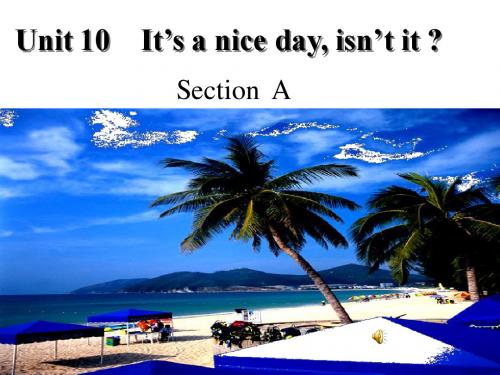
Homework:
Try to learn 1a and 1c by yourself.
B: No, it’s never crowded. Well, have a good day! A: Thanks. GoodbyeThese books are really great, aren’t they?
Looking through books in a bookstore. The traffic is very busy, isn’t it? waiting to cross a busy street.
Fill in the blanks: isn’t ____ ? she 1. His mother is a doctor, ______ aren’t they 2. The dogs are fighting, _______ _____? 3. There is a boy in our classroom, isn’t _______ ? there _______ 4. There were many cars in the street, weren’t ________ ? there _________ 5. There will be robots in our families, won’t ______ ? there ________
3a Complete the conversation. Write sentences in the blanks. A: This is great weather, isn’t it? B: It sure is. But it’s a little hot for me. A: Oh, I love hot weather. I’m going to the beach today . B: Which beach are you going to? A: I’m going to Today Beach. Where do you usually go ? B: I usually go to Sandy Beach. A: Is it very crowded ?
八年级英语Unit_10_It’s_a_nice_day__isn’t_it可用)

我忘了我的雨伞。
你认为正午之前它将会停吗?化学老师有些严肃但其他的都好当开始和陌生人交谈时感到不确信是很自然的我转向我身边的人并且自我介绍他害羞的回答完成下列附加疑问句,每空一词。
11. You were really happy to meetCarlos, ________ ________?12. She has nothing to do here, ________ ________?13. They went to Sunny Beach, ________ ________?14. Linda hasn’t been to Beijing, ________________?15. There are two new American students in your class, ________ ________?16. She’s Tom’s cousin, ________ ________? (完成附加疑问句)17. I’ll think of you as we watch the White Socks win the game. (对划线部分提问)________ ________ you think of me?18. How much did the T-shirt cost you? (改为同义句)How much did you ________ ________ the T-shirt?19. I have ever seen the three astronauts with my own eyes. (改为否定句)I have ________ ________ the three astronauts with my own eyes.20. Did you have a good time at Franklin Lake? (改Did you ________ ________ at Franklin Lake?.单项选择1. Don’t ________ the road when the traffic lights are red.A. crossB. acrossC. pastD. through2. Our English teacher is friendly ________ us. We all like him.A. fromB. toC. withD. at3. The map makes ________ easier for us to travel around the city.A. themB. thisC. thatD. it4. —They went to school late, didn’t they?—________. The teacher asked them to be at school earlier next time.A. Yes, they didB. No, they weren’tC. Yes, they wereD. No, they didn’t5. —She’s really good, isn’t she?—________.A. She is sureB. She isn’t sureC. She sure isD. She sure not完形填空。
Unit 10 It's a nice day,isn't it

Unit 10 It’s a nice day,isn’t it?反义疑问句:反义疑问句表示提问者对某事有一定的主见,但没有把握,于是借一个简短的一般疑问句来得到对方的证实。
二句型(反义疑问句):①前肯后否;②前否后肯。
注意:1、附加的简短的疑问句的主语不能用名词,只能用代词;谓语只能用系动词、助动词、情态动词,且要遵循“人称、时态、数一致”如:1)He isn’t a teacher ,is he?2)Lin went to his uncle’s home ,did he?2、对于反义疑问句的回答,如果是“前否后肯”的句子,思维正好同中国人相反。
如:----He doesn’t like singing ,does he?他不爱唱歌,是吗?——Yes,he does./No,he doesn’t.不,他喜欢。
/是的,他不喜欢。
特殊的反义疑问句:1.祈使句后一般加上will you 例如Look at the blackboard, will you?看黑板,好吗? 2 Let's...,后的反意疑问句用shall we例如:Let's go home, shall we/ shan't we? 回家吧,好吗? 3 Let us/me...后的反意疑问句用will you例如:Let me have a try, will you? 让我试一试,行吗? 4 当陈述部分有否定意义的词:few, little, ,hardly, never, not, no, no one, nobody, nothing, none, neither等,其反意疑问句需用肯定结构。
1You have never been to Beijing, have you? 2She has few friends, does she? 3Tom had little work to do, did he? 4You can hardly do the work, can you?He sure is!他当然是了!Thank-you note for a gift.一份礼物的感谢信a thank-you note for..感谢信take notes 做笔记,做记录Do you think it will stop by noon?你认为它会在中午停止吗?By用法(1) go to school by bus.(2)We have learned a lot of things by the end of the term.到期末止,我们学到了很多东西。
八年级英语下册 Unit 10 It’s a nice day , isn’t it Period4
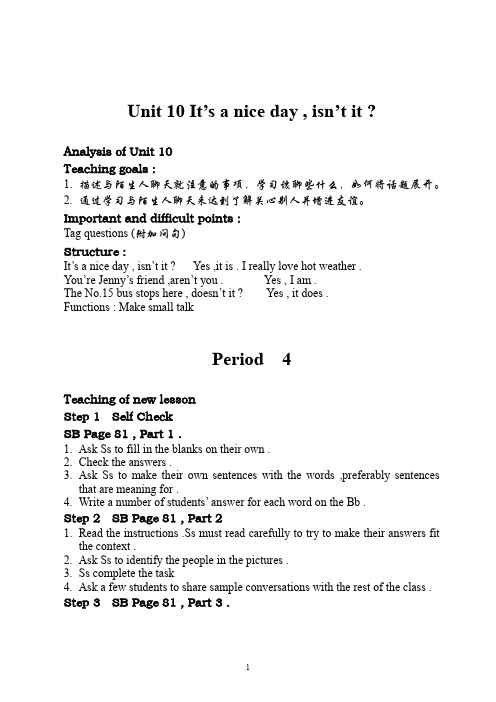
Unit 10 It’s a nice day , isn’t it ?Analysis of Unit 10Teaching goals :1.描述与陌生人聊天就注意的事项,学习该聊些什么,如何将话题展开。
2.通过学习与陌生人聊天来达到了解关心别人并增进友谊。
Important and difficult points :Tag questions (附加问句)Structure :It’s a nice day , isn’t it ? Yes ,it is . I really love hot weather .You’re Jenny’s friend ,aren’t you . Yes , I am .The No.15 bus stops here , doesn’t it ? Yes , it does .Functions : Make small talkPeriod 4Teaching of new lessonStep 1 Self CheckSB Page 81 , Part 1 .1.Ask Ss to fill in the blanks on their own .2.Check the answers .3.Ask Ss to make their own sentences with the words ,preferably sentencesthat are meaning for .4.Write a number of students’ answer for each word on the Bb .Step 2 SB Page 81 , Part 21.Read the instructions .Ss must read carefully to try to make their answers fitthe context .2.Ask Ss to identify the people in the pictures .3.Ss complete the task4.Ask a few students to share sample conversations with the rest of the class . Step 3 SB Page 81 , Part 3 .1.Read the instructions .2.Ask Ss to identify the locations in the pictures .3.Ss complete the task .4.Ask a few students to share sample conversations with the rest of the class . Step 4 Review this unit .Exercise designing for Period 4 单项选择( )1.—Do you think it will stop raining noon ?—Well , it is really hard to say .A. inB. byC. onD. for( )2. —This is great weather , isn’t it ?—It sure is .But it’s a little hot me .A. toB. onC. withD. for( )3.After you finish your homework ,you can go online for a while ,but you are not allowed computer games .A. doing , playingB. to do , playingC. doing , to playD. to do , to play( )4.This is the place I spent my childhood .A. thereB. whereC. thatD. which( )5.The box is heave for us carry upstairs .A. very, toB. so, toC. too, toD. very, not to( )6.If you go right now ,you late .A. won’t , willB. don’t ,will beC. won’t , areD. don’t , are( )7.Why come a little earlier ? We have had a lot of delicious food prepared .A. don’tB. don’t youC. not toD. aren’t you( )8. fun it is to swim in the sea on such a hot day .A. what aB. whatC. How muchD. How a教学后记:。
八年级英语unit 10 it’s a nice day, isn’t it 人教新目标版知识精讲

初二英语Unit 10 It’s a nice day, isn’t it?人教新目标版【本讲教育信息】一. 教学内容:Unit 10 It’s a nice day, isn’t it?一. 语法重点:反意疑问句二. 语言目标:1. 闲聊在英语中的定义和操练。
2. 学会写感谢信。
三. 重点单词:1. umbrella n. 雨伞,伞2. noon n. 中午3. sandy adj. 沙的4. goodbye int. 再见5. look through 浏览6. bookstore n. 书店7. cross v. 穿过;横过8. elevator n. 电梯9. low adj. 低的10. slow adj. 慢的、缓慢的11. cost v. 价值(若干);花12. note n. 短信,笔记13. get along 相处14. baby n. 婴儿,小孩15. at least 至少16. holiday n. 假日、节日17. be careful 小心,当心18. traffic n. 交通19. review n. 复习,回顾20. somewhere adv. 某处,在某处四. 重点短语1. small talk 闲聊2. talk to / with…与…交谈3. by noon 到中午4. opening question 开场白、起始句5. Have a good day! 祝你今天愉快6. look through 浏览,仔细检查7. wait in line 排队等候8. cross the street 过马路,过街9. Thank sb. for doing sth. 谢谢某人做某事10. be friendly to …对…友好11. feel like 想要、欲12. come along 出现、陪伴13. get along 融洽相处14. at this time 在这个时候15. at least 至少、最少16. be careful 小心,谨慎五. 重点句子:1. -It’s a nice day, isn’t it?-Yes, it is.2. -You’re Ben’s sister, aren’t you?-Yes, I am.3. -It looks like to rain, doesn’t it?-Yes, it does.4. -This is great weather, isn’t it?-It sure is.5. Have a good day!6. How much did that shirt cost?7. How big is your apartment?8. What do you think of the school?9. Thank you so much for inviting me.六. 语法重点:反意疑问句反意疑问句是初中阶段英语教学的重点和难点,而这部分内容在教材中又比较分散,有必要把分散的知识集中起来串讲,分块复习,各个击破以提高综合运用能力与应试能力。
- 1、下载文档前请自行甄别文档内容的完整性,平台不提供额外的编辑、内容补充、找答案等附加服务。
- 2、"仅部分预览"的文档,不可在线预览部分如存在完整性等问题,可反馈申请退款(可完整预览的文档不适用该条件!)。
- 3、如文档侵犯您的权益,请联系客服反馈,我们会尽快为您处理(人工客服工作时间:9:00-18:30)。
【同位互助 短语过关】
1. look like看起来像… 2. 到中午为止 by noon 3. on the weekend 在周末 4. 浏览 look through 5. wait in line排队等候 6. 球迷 a ball game fan 7. have a wonderful time过得愉快 on Saturday night 8. 在周六晚上
【教学重点】
复习并掌握Unit10的单词、短语和重点句 型。
【教学难点】
复习并掌握语法:学习并掌握反意疑问句。
【英汉互译 突击单词】
cost 花 费 穿过 cross low 低 的 多沙的 sandy slow 慢 的 交通 traffic note短信,笔记 电梯 elevator bookstore书 店 中午 noon
为…而非常感谢你 9. thank you so much for … 10. 对..友好 be friendly to feel like 感觉像… 11. 12. …的一部分 part of
13. have a hard time doing… 做…时很费劲 14. 出现, come along 15. enjoy doing 享受做…的乐趣 16.擅长于… be good at … 17. help sb. with sth=help sb. (to) do sth.. 帮助某人做某事 18. 容易的多 a lot easier 19. get along 相处 20. 小心去做某事 be careful to do sth. 21. at least 至少 22. 此时
Unit10 It’s a nice day,isn’t it? (Revision)
【教学目标】
知识目标:1.复习并掌握Unit10的单词、短 语和重点句型。 2.复习并掌握语法:学习并掌握反 意疑问句。 3.复习并学会写感谢信。 能力目标: 学会与人聊天沟通情感. 学会写 感谢信。 情感目标:通过闲聊加强人际交往,并注 意在闲聊中注意回避他人隐私。
at this time
三 1 2
请快速说出英语及其用法。 雨伞 中午 , 一把雨伞 , 在中午 。 。
3
4
再见 sb 。
浏览
,跟某人告别 say
, 查找
goodbye
。
to
5
6 7 8 9
穿过(动)
花费 相处 至少 假日
,
(介)
。
,
, 与某人相处融洽 , 最多 at ,度假 most 。 。
。
10 小心
7. 在 I think,I believe,I suppose,I guess等结构中,简短问句的主语往往与从 句的主谓保持一致,例如: I think she’s out,isn’t she? 我想她出去了,是吗? I don’t think it’s true,is it?我认为那 不是真的,对吗? 注意:在回答反意疑问 句的问题时,如果回答是肯定的,要用yes, 否定的要用no,在第一部分是否定形式时要 特别注意,这时的英语回答与汉语回答是有 区别的。例如:This isn’t yours,is it?这
【达标训练 自我检测】
一、从各题后所给的三个选项中选择最佳答案。 C ( )1. This is______ terrible weather. A. a B. an C. / B ( )2. —He is an outstanding violinist, isn’t he? — . A. Sure is he B. He sure is C. He is sure ( )3. —I’ll go to the beach with my sister tomorrow. A —Have a day! A. good B. well C. betterA ( )4. We three are good friends. We like skating. A. all B. either C both C. ( )5. They had a hard time the taxi.
16.干某事费劲:have a hard time doing sth.: I was having a hard time finding until you came it along(出现).直到你出现我一直在费劲地找它。 17.喜欢干某事:enjoy doing sth.: I enjoyed meeting Carlos.我喜欢与卡洛斯见面 18.擅长、、、:be good at: is good at ,isn’t he?他擅长数学,对吗? He
Mary doesn’t like reading,does she? 玛丽不喜欢读书,是吧? (前一部分为否定形式,后一部分就用 肯定形式)
1. 如果陈述句有一个助动词(包括can, must,need等情态动词),其简短问 句用同一个助动词。例如:He can swim,can’t he?他会游泳,对吗? 2. 如果陈述部分包含no,never, hardly,few,little,seldom等否定词, 简短问句部分应用肯定形式。 例如:You have no time on Monday, have you? 星期一你没有时间,是吗?
A open B close C opened D closed
二、根据句意及首字母提示,填写适当的单词。 mbrella 1. —It’s rainy today, take your u with you. —I will, Mom. ross 2. Go straight on and c the bridge, you’ll find the post office. 3. —Oh, Dick, you’re late again. raffic —I am so sorry. But the t is really busy this morning. levator 4. He lives on the 25th floor and takes the e up and down every day. 5. —Did you tell your mother that you would be home late in the evening? ote —Of course. I left a n on her dresser.
5. 当陈述句部分含有否定词如 nothing,nobody等不定代词时,简短 问句部分应用肯定结构。为避免重复, 用代词it来代替nothing;用they或he 来代替nobody。例如: Everything goes well,doesn’t it? 一切顺利,是吗? Everyone is here,aren’t they? (注意:此句问句与前句动词的数不一 致。)
3.
I saw him C
basketball on the playground on my way home .
A to play B plays C playing D played 4. This is the most beautiful park I have A visited .
A ever B never C not D yet 5.It’s cold . We’d better keep the door D .
【自学语法 共克疑难】 反意疑问句
1)定义:提出情况和看法,询问对方 是否同意的句子叫反意疑问句。 2)结构:陈述句+简略疑问句 3)用法:a.前肯后否;前否后肯。 b.反问部分的时态和人称与陈述部分 的人称和时态一致。 c.本身表否定的
Mary likes reading,doesn’t she? 玛丽喜欢读书,是吧? (前一部分为肯定形式,后一部分用否 定形式)
Thank you so much 11.多谢你如此盛情地邀请我: for inviting me. 12.、、、、中的一些:some of…..: some of 我不认识其中的一些女孩I didn’t know the girls. 13.对、、、友好:be friendly to sb.: 他们对我很友好They were all friendly to me . 14.感觉像、、、、:feel like …: 我感觉是小组的一部分了I feel likepart of the group now. 15.领某人参观、、、:show sb.around、、、: showing me around 多谢令我参观学校Thanks for the school.
。
【小组合作 句型探究】
1.看样子要下雨,不是吗?It looks like rain ,_______________? doesn't it 2.你认为到中午时雨会停吗?Do you think it’ll stop by noon ? I 3.我希望这样。我想去游泳。 hope soI want to go swimming . 4.天对我来说有点热。It’sa little hot for me. 5.在书店看书: look throughbooks in a bookstore.
一. 选择题
1.Have you ever ____D_____ Dong ping Lake?
A went to B gone to C been in D been to 2.----I usually go to bed late at night . And you ? ----A .
A So do I B SO I do C So I am D So I am
6. 祈使句后面的简短问句使用 will you? shall we?它们不是真正的疑问句(意为 请),但常用升调。will,would,can, can’t及shall we用来告诉人们该做什么事, 表请求。 例如:Give me a pen,will you? 请给我一支笔。 Open the door,will you? 请打开门好吗? Let’s go together,shall we? 咱们一起走吧。
